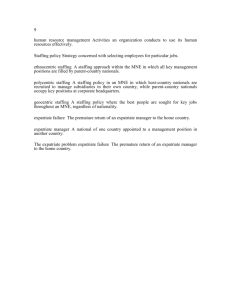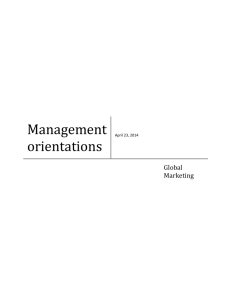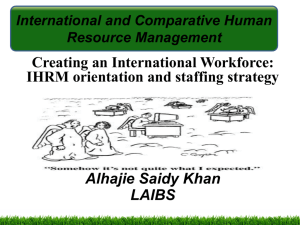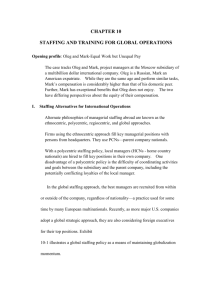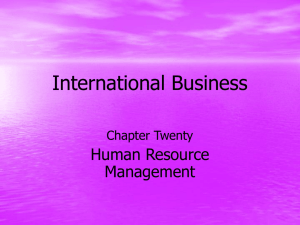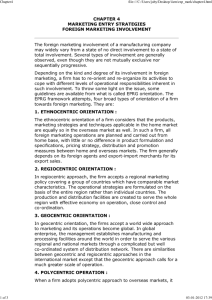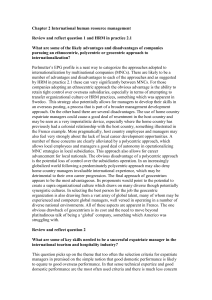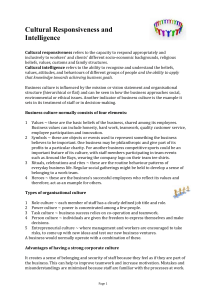Ch - International Business courses
advertisement
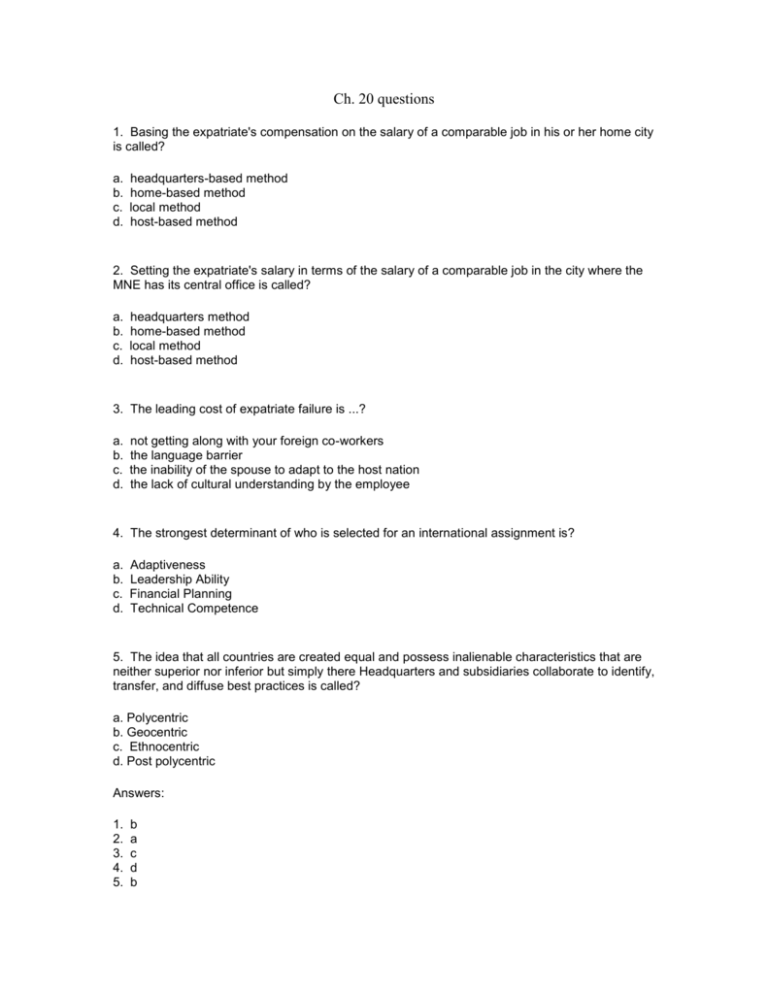
Ch. 20 questions 1. Basing the expatriate's compensation on the salary of a comparable job in his or her home city is called? a. b. c. d. headquarters-based method home-based method local method host-based method 2. Setting the expatriate's salary in terms of the salary of a comparable job in the city where the MNE has its central office is called? a. b. c. d. headquarters method home-based method local method host-based method 3. The leading cost of expatriate failure is ...? a. b. c. d. not getting along with your foreign co-workers the language barrier the inability of the spouse to adapt to the host nation the lack of cultural understanding by the employee 4. The strongest determinant of who is selected for an international assignment is? a. b. c. d. Adaptiveness Leadership Ability Financial Planning Technical Competence 5. The idea that all countries are created equal and possess inalienable characteristics that are neither superior nor inferior but simply there Headquarters and subsidiaries collaborate to identify, transfer, and diffuse best practices is called? a. Polycentric b. Geocentric c. Ethnocentric d. Post polycentric Answers: 1. 2. 3. 4. 5. b a c d b Chapter 20 Questions 1.) Someone that is sent from his or her own home country to live and work in another country is a/an: a) illegal alien b) expert c) expatriate d) third-country national 2.) General Electric is currently using a ________ strategy, as well as a _____ staffing approach. a) Global, geocentric b) multidomestic, polycentric c) global, geocentric d) transnational, ethnocentric 3.) Which of the following is a reason a company would want local to deal with their foreign operations? a) Cost containment b) high turnover among locals c) social integration d) command and control 4.) It would make sense when using an ethnocentric staffing approach to use a _____ strategy. a) multidomestic b) international c) transnational d) global 5.) a) b) c) d) The leading cause of expatriate failure is: over-training too much preparation failure to adapt leadership ability Correct answers: 1….c 2….a 3….a 4….b 5…. Chapter 20 Questions 1) Three perspectives anchor an MNE’s staffing policy are, except: a) b) c) d) Ethnocentric Polycentric Geocentric Multicentric 2) A_________________ staffing policy seeks the best people for key jobs throughout the organization, regardless of their nationality. a) Geocentric b) Polycentric c) Multicentric d) Ethnocentric 3) a) b) c) d) The leading cause of expatriate failure is: Technically incompetence from the expatriate to adapt to host country Religion conflicts Missing the food The inability of a spouse to adapt to the host nation 4) Parts of a preparation and development course for an expatriate upon moving to the host country are, except: a) Cultural sensitivity awareness b) General country understanding c) Start eating the host country food to adapt before coming d) Training gaps and trends 5) a) b) c) d) The languages to be studied for the next few decades are, except: Portuguese Chinese Russian Japanese Answers: 1) D 2) A 3) D 4) C 5) D Chapter 20 Questions 1.) This refers to activities necessary to staff the organization. a.) Human resource management b.) Organizational procedures c.) Globalizing citizens d.) None of the above 2.) An ethnocentric staffing approach a.) fills all key management positions with home-country nationals b.) uses host-country nationals to manage local subsidiaries c.) seeks the best people for key jobs throughout the organization, regardless of their nationality d.) none of the above 3.) A Polycentric staffing approach a.) uses host-country national to manage local subsidiaries b.) fills all key management positions with home-country nationals c.) seeks the best people for key jobs throughout the organization, regardless of their nationality d.) none of the above 4.) Adaptiveness refers to a person’s potential for a.) b.) c.) d.) Self-maintenance and personal resourcefulness Developing satisfactory relationships Interpreting the immediate environment All of the above 5.) MNE’s use various cost-of-living indexes and a.) b.) c.) d.) Increase compensation when the foreign cost is higher Do not reduce compensation when the foreign cost is lower Remove the differential when the manager is repatriated All of the above Answers: 1.) A 2.) A 3.) B 4.) D 5.) D
